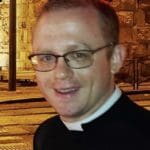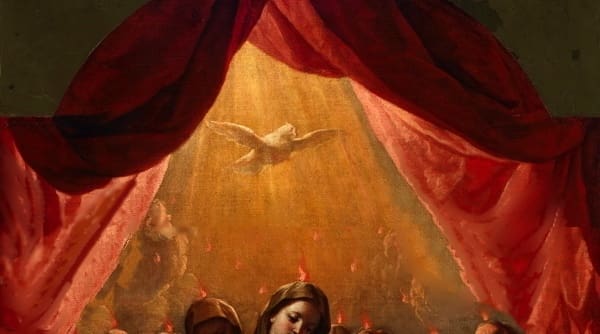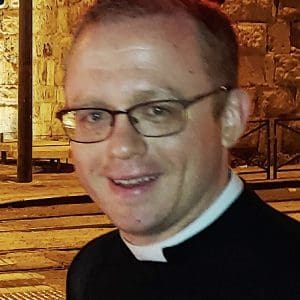Pentecost is one of the three major feasts of the Church’s liturgical calendar in that it is next to Easter and before Christmas in prominence. Fifty days after Easter and ten days after Jesus ascended into heaven, now the Father and Son send the Holy Spirit, who descends in tongues of fire (Acts 2) and give birth to the Church, giving all her members life “in the fulness of God.” (Eph 3:19) There are many themes that intersect with the Holy Spirit’s Coming. These themes will be drawn from the readings of the Mass of the Extended Vigil of Pentecost (2011 English Roman Missal).
The Holy Spirit and the Undoing of the Tongues of Babel
A major theme of Pentecost is the reunification of the human family under the one supernatural family of God, the One, Holy, Catholic, and Apostolic Church. This fragmentation started in the Garden of Eden with Adam and Eve freely committing original sin. The problem of sin evolved in a different manner in the construction of the Tower of Babel (First Reading, Extended Vigil Gen 11:1-9). The Church refers us to this reading as a bookend near the beginning of scripture that pairs with the bookend that is Pentecost. Babel in Hebrew also means Babylon. It points to the beginning of the great evil city that would be one of the greatest symbols of opposition to God’s people, and later the place where the people of God would be defeated, held captive, and exiled.
Babel is also the root of the term “babbling,” or “making unintelligible sounds”. The city that opposes God is also the city of unintelligibility, and this suggests that opposition to God through lack of faith eventually leads to loss of intellectual ability and lack of reason. We also see that in constructing the tower of Babel, man in his opposition to God employs technology and synthetic materials opposed to natural goods and natural order. This is seen in the use of bricks and tar to construct the tower which are artificial materials made through human ingenuity. I can often be tempted to this same prideful self-reliance and willfulness in the interior life. Instead of giving me the ideal that I want, the pride of Babylon can lead to unintelligibility and bondage to the devil because I act apart from the Holy Spirit and God’s plan of salvation.
Dom Prosper Gueranger in The Liturgical Year reflects upon how the confusion of Babel that is undone by the coming of the Holy Spirit and the birth of the Church at Pentecost:
Since the confusion at Babel, there have been as many languages as countries; communication by word has been interrupted. How, then, is the word to become the instrument of the world’s conquest, and make one family out of all these nations that cannot understand each other? Fear not: the Holy Spirit is all-powerful, and has provided for this difficulty. With the other gifts, wherewith he has enriched the hundred and twenty Disciples, he has given them that of understanding all languages, and of making themselves understood in every language. In a transport of holy enthusiasm, they attempt to speak the languages of all nations—their tongue and their ear take in, not only without effort, but even with charm and joy, this plenitude of word and speech which is to reunite mankind together. The spirit of love has annulled the separation of Babel; men are once more made Brethren by the unity of language.
Both at Babel and Pentecost, all of humanity is represented (cf. Gen 10, Acts 2:9-11 – First Reading, Pentecost Sunday). At both events, there is confusion because of speaking; where at babel they are confused because they don’t understand, at Pentecost they are confused because they do understand. The tower of Babel tells us how mankind was fractured because of sin whereas Pentecost tells us how mankind is reunited as a family through the Holy Spirit, which forms the Church as the new family of God. We also see Peter’s leadership and preaching highlighted as a principle of unity within the new family of God preventing it from fracturing again (Acts 2:14-42).
The Holy Spirit and the Law of the New Covenant Written on Our Hearts
The next reading foretells the sealing of the Mosaic Covenant at Mount Sinai (Exodus 19:3-8, 16-20b, Second Reading, Extended Vigil) Dom Gueranger in his Liturgical Year reflects on the the events of the sealing of this Covenant. He ties the Pentecost of the Mosaic Law being fulfilled by the Pentecost of the New Law, where the law of God is written on the hearts of all believers through the grace and power of the Holy Spirit:
In the Old and figurative Law, God foreshadowed the glory that was to belong, at a future period, to the Fiftieth Day. Israel had passed the waters of the Red Sea, thanks to the protecting power of his Paschal Lamb! Seven weeks were spent in the Desert, which was to lead to the Promised Land; and the very morrow of those seven weeks was the day whereon was made the alliance between God and his people. The Pentecost (the Fiftieth Day) was honored by the promulgation of the ten commandments of the Divine Law; and every following year, the Israelites celebrated the great event by a solemn Festival. But their Pentecost was figurative, like their Passover: there was to be a second Pentecost for all people, as there was to be a second Pasch for the Redemption of the whole world. The Passover, with all its triumphant joys, belongs to the Son of God, the Conqueror of death: Pentecost belongs to the Holy Ghost, for it is the day whereon he began his mission into this world, which, henceforward, was to be under his Law.
But, how different are the two Pentecosts! The one, on the rugged rocks of Arabia, amidst thunder and lightning, promulgates a Law that is written on tablets of stone; the second is in Jerusalem, on which God’s anger has not as yet been manifested, because it still contains within its walls the first-fruits of that new people, over whom the Spirit of love is to reign. In this second Pentecost, the heavens are not overcast, nor is the roar of thunder heard; the hearts of men are not stricken with fear, as when God spake on Sinai; repentance and gratitude, — these are the sentiments which are now uppermost. A divine fire burns within their souls, and will spread throughout the whole world. Our Lord Jesus had said: I am come to cast fire on the earth; and what will I, but that it be kindled? (Luke 12:49) The hour for the fulfillment of this word is come: the Spirit of Love, the Holy Ghost, the eternal uncreated Flame, is about to descend from heaven, and realize the merciful design of our Redeemer.
When the Mosaic Covenant was forged between God and Israel at Mount Sinai, the law is given in a fearsome storm and on tablets of stone. At Pentecost (Acts 2:1-11, First Reading Pentecost Sunday) there is a peaceful storm of the spirit (the rushing wind, the lightning like tongues of fire) and the writing of the law of the New Covenant on the hearts of all believers by the power of the Holy Spirit. This also points to the fulfillment of the prophecy of Jeremiah (Jer 31:31-34) of the writing of the law on the heart (the gift of the Holy Spirit) as well as the knowledge of God (the seven Gifts of the Spirit) and the forgiveness of sins (Cf. Hebrews 12:18-24). This shows us also how the grace and power of the Holy Spirit helps us to use our strengths and gifts with God in love and gentleness and to surrender our weaknesses to Him in healing.
The Holy Spirit and Dead Rising Back To Life
The Third Reading (Ezekiel 37:1-14, Extended Vigil) speaks of the prophecy of the dry bones rising from the dead and coming back to life through the power of the Spirit of God. Dry bones not only represents the hopes of God’s people but also the hopes of all the faithful which have been tried and tested in this life. This prophecy is fulfilled at Pentecost with a widespread representative group of Israelites from around the world (Cf. Acts 2:5-11) gathered together in Jerusalem and “resurrected,” and “reunited” as the new Israel through the blowing of God’s spirit. They form the resurrected, re-created people of God that is the infant Church, the restored Kingdom of David, the “Israel of God” (Cf. Gal 6:16). God’s plan of salvation (cf. Rom 1:16) through His Church is for all peoples of all times and it unites all of humanity both in heaven and earth into one Church, the Communion of Saints.
The Holy Spirit and the Faithful Remnant
The Fourth Reading (Joel 3:1-5, Extended Vigil) is cited directly by St. Peter in his Pentecost sermon (Cf. Acts 2:17-20) as being fulfilled with the coming of the Holy Spirit. We also see the Prophet Joel allude to the future pouring out of God’s spirit and a “Remnant” on Mount Zion. This “remnant” is the three thousand people who, together with the twelve Apostles and 120 believers, form the nucleus of the Church as the new Israel. This event is also accompanied by signs of God’s presence that we saw on Mount Sinai with the sealing of the Mosaic Covenant: “blood, fire, smoke, and darkness.” Some of these signs we see repeated at Jesus’ Crucifixion where He gives us the spirit, whereas others we see occur at Pentecost where the Spirit is poured out.
The Holy Spirit – The One Who Teaches Us to Pray
In the Fifth Reading (Rom 8:22-27, Extended Vigil), Saint Paul reminds us that the Holy Spirit is our great comfort in the spiritual warfare that we wage in this earthly life. The life of faith is full of both hope and trial where we face suffering and are subject to the evils of this present world. The presence of Holy Spirit whom we receive in the Sacraments and daily prayer assures us that we have eternal life, even when we are tried and tested. The Holy Spirit teaches us how to pray and even prays on our behalf, serving as the great interpreter. At Pentecost, the Spirit through the gift of tongues communicates the words of the Apostles in the various languages of all the people. In prayer, the spirit interprets the longings of our heart into the language of God, helps us hear God’s voice speaking to us, and yield to his presence which strengthens, consoles, and heals us.
The Holy Spirit – the Living Water flowing from the Heart of Jesus to Us in the Sacraments
The Gospel of the Vigil of Pentecost (John 7:37-39, Extended Vigil) is where Jesus identifies Himself as the New Temple, and the Holy Spirit as the River of Living Water that flows from him. This is a fulfillment of the prophecy of Ezekiel (Ezekiel 47) where the river Gihon, which flowed from the Temple Mount in Jerusalem is replaced with a supernaturally spectacular river flowing from the Temple. It is from the pierced Sacred Heart of Jesus on the Cross (Cf. Jn 19:34) that this river of living water flows. This river of the Holy Spirit is also seen as the river of Baptism, which conveys the Spirit to believers (Cf. Acts 2:38). At the time of festivals, the Old Temple flowed with Blood and water, the blood of animal sacrifice mixed in with purification water is spilled out of a pipe underneath the Temple and ran down to join the brook in the Kidron Valley. This is also a sign of the sacraments (Eucharistic Blood and Baptismal Water) that flow from the Body of Christ as a kind of River of Life bearing the Holy Spirit through time and space to the whole human family.
The Holy Spirit makes us temples of the Holy Trinity through the Sacraments of the Church and through the commitment to daily mental prayer. By these means, Jesus then lives again in the uniqueness of who each of us are through the Holy Spirit. This desire was echoed also in the prayer of Saint Elizabeth of the Trinity, in that she asks the Holy Spirit to “create in my soul a kind of incarnation of the Word: that I may be another humanity for Him [Jesus] in which He can renew His whole Mystery…[And God the Father] Bend lovingly over Your poor little creature; ‘cover her with Your shadow.’ seeing in her only the ‘Beloved in whom You are well pleased.”
So, we pray this Pentecost Sunday, that the Holy Spirit may adorn our souls with his healing balm and grace so that Jesus Christ may be perfected in us as we live, light, and lead the way to union with Him. May the Holy Spirit give us give us the fulness of life with Him on High both in this life and in preparation for the eternal joys of divine union that will be brought to fulfillment with Him, the Father, and the Son, for all eternity in Heaven.
_____________________________________________
Image: Antonio Palomino, Public domain, via Wikimedia Commons




